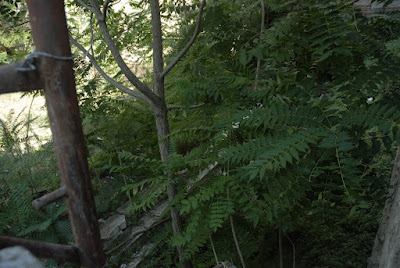(http://www.americanchronicle.com/articles/view/155730)
The Archaic temple of Aphrodite is dated to the end of the 6th cBC and it was originally discovered during excavations in 1936, only to be lost years later in the destruction of Nazi occupation of the city and the subsequent post war development. It is at the beginning of Dioiketeriou street.
Besides its archaeological and cultural significance, through its mere existence this temple flies at the face of the pseudo-macedonists of Skopje and their apologists, who try to falsify history reinventing it:
"8) GREEK CLAIM: "Macedonians worshiped the same Gods as the rest of the Greeks Several temples dedicated to the Greek Gods have been discovered in Macedonia and especially in Dion the religious center of ancient Macedonians. It is obvious that the Macedonians worshiped the 12 Olympian Gods as the rest of the Greeks..."
(Skopian) REPLY:
"...the Macedonians did not worshiped the Greek gods, but also there is not a single temple discovered on the territory of Macedonia which resembles the temples in Greece...
...The fact that the Macedonians had their own gods, does prove that they had different religion from the Greeks who worshiped different gods...
...Macedonians had their own Gods and religion, separate from the Greeks...
...Macedonians had their own gods and religion distinct from the Greeks..."
One of the arguments the Skopian pseudomacedonists propagate is that Ancient Macedonia does not have any Greek temples, and that the ancient Mmacedonians did not believe in the same Gods as the ancient Greeks. Some Skopjean charlatans, like the infamous pseudo-scientists Tendov and Boshevski, professors at the Универзитет „Св. Кирил и Методиј“ - Скопје / Univerzitet „Sv. Kiril i Metodij“ - Skopje (professor Boshevski is also a member of the SLAVO-Macedonian Academy of Arts and PSEUDO-Sciences in Skopje) go even so far as to CREATE imaginary deities, with invented names such as God Sa, God Ve, God Vo, God Vi, God De, God Ho, God Xo, God Li, God Itchka, God Ka and God Zmija! (The ROSETTA STONE and the Tendov-Boshevski controversy-Illusions of ancient grandeur through Balkan pseudoscience. http://macedonianissues.blogspot.com/2010/01/blog-post.html).
Greeks have the expression "Ta marmara den pseudontai": "Marbles do not lie", meaning that while every charlatan can invent any pseudo-makedonski theory they want, the proof is always to be found in the documents of the ancient epigraphy, by facts invested by history in the ground.
The temple of Aphrodite in the center of Thessalonike speaks clearer about the Hellenic nature of this ancient Macedonian city which bears the name of Casander's wife, Alexander the Great's half sister Θεσσαλονίκη/Thessaloniki, and it speaks more sensibly than any Skopjean boisterous cries and screams about a supposed "proto-Slavic" Makedonskata Солун/Solun.
The site of the temple is on private land. The owners want the temple ruins to be covered and a permit to be allowed for building a residential condominium building over it.
 All defenders of Hellenic culture need to intervene and support the purchase of the privately owned city lot by the Greek Archaeological Society. The archaeological site of the temple of Aphrodite needs to be restored and developed for visitors and scholars alike and for the visual enjoyment of the local Thessalonians too.
All defenders of Hellenic culture need to intervene and support the purchase of the privately owned city lot by the Greek Archaeological Society. The archaeological site of the temple of Aphrodite needs to be restored and developed for visitors and scholars alike and for the visual enjoyment of the local Thessalonians too. The architectural members of the temple have been recovered during the first excavation in the 1930's and they are currently housed or being on display at the Archaeological Museum of Thessalonike.

Few cities around the world wide have been blessed with such multi-leveled archaeological wealth. Thessalonike is the envy of others, in this respect. Poor Skopjeans, on the other hand, have zero proof for their baseless and unhistorical claims over ancient Macedonia.
All they can do is use names of ancient Greek kings, paraphrasing them to confront to their Slavonic language, Филип/Filip for Φίλιππος/Philippos and Александар/Aleksandar for Αλέξανδρος/Alexandros, in order to re-name Yugoslav streets, stadia, airports and highways into Slavo-"Makedonci" ones. To their dismay, the land their forefathers settled back in the middle ages, during the descent of the south Slavs into the Byzantine Balkan peninsula, is not cooperating: all the statues that the Skopjeans discover when they dig into their earth have (alas!) Greek inscriptions on them. To dupe their own population into believing and accepting the fantastical ultra-nationalist myths of fake Makedonism, FYROM's Government went to Italy and ordered modern statues to raise them in the middle of the Dardnanian city of Scupi, modern Skopje. Of course they also paid the Italians to scribe Cyrillic letters on these modern statues, since the ancient ones were not cooperating with Skopje's proto-Slavonic Makedonija myths.
Greece, like China, is a country of four thousand years of un-disrupted habitation of the same historic people, with continuity in culture and history, and millennia of survival and development of its language. The legacy of the ancient Macedonians is not attested only in the Greek language of the modern inhabitants of Makedonia, in Northern Greece. It is also attested in the vast cultural relics spread throughout Μακεδονία/Macedonia: Homeric Macedonian "toumbes"-tombs, ancient Greek theaters, Hellenic epigraphy and, of course, archaic temples to ancient Greek Gods and Goddesses, like the aforementioned Naos-temple of Aphrodite in downtown Thessalonike.

The Greek Archaeological society needs to buy out the city lot on which the foundation and base of the temple has been discovered from the private owners and to do what they do best: restore the temple Aphrodite in downtown Thessalonike in a meticulous, scientific way, stone by stone, following the Venice convention Archaeological standards, like they do in Archaeological sites throughout Greece.
P.S. The three photographs of the existing site were taken by the author.
Thessaloniki, Makedonia, Fillipos, Olimpia, Alexandros and all the names is Greek for one resson.... THEY are Greek
ReplyDelete